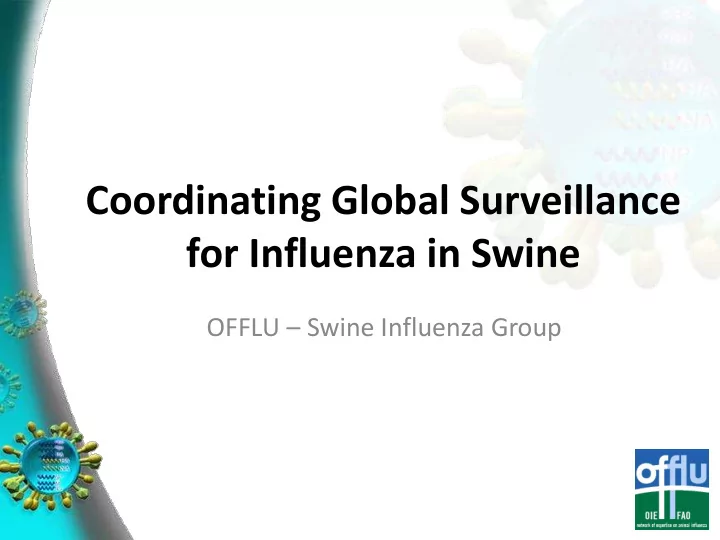

Coordinating Global Surveillance for Influenza in Swine OFFLU – Swine Influenza Group
2009 pH1N1 Lessons Learned • Media, fear, trade, politics, etc., often ignored the science • Geographic and host origins of virus unclear – Gaps in sequence data • Mechanisms of human adaptation and virulence unclear • Virus capable of infecting multiple host species but well adapted to swine and humans – Similar in phenotype to US endemic TRIG viruses • Potential evolution of pH1N1 in multiple species unprecedented with current milieu of co-circulating viruses • Swine influenza data underrepresented overall and absent in many regions • Active and passive surveillance in swine exist in many regions, but mostly private or unreported and uncoordinated • Our engagement with human influenza sector is critical
Genetic Analysis Sequencing Antigenic Analysis Swine Studies
Peer Reviewed Publications on Influenza Epidemiology PubMed Records 1400 1200 1000 800 600 400 200 0 Swine Avian Human Swine Avian Human
Sequences in GenBank Influenza Virus Resource Full Length Gene Sequences Whole Virus Genome Sequence Sets 80000 6000 70000 5000 60000 4000 50000 40000 3000 30000 2000 20000 1000 10000 0 0 Swine Avian Human Swine Avian Human
Endemic SIV Worldwide TRIG/North American Avian Human H3 Seasonal Classical Swine 2009 pH1N1/Eurasian Swine Human H1 Seasonal European Swine/Human Seasonal
Genetic Diversity of SIV in Southern China Vijaykrishna D, et. al. Long-term evolution and transmission dynamics of swine influenza A virus. Nature. 2011 May 26;473(7348):519-22.
Global influenza monitoring in swine Benefits to Animal Health • Surveillance for influenza viruses in pigs almost non- existent for decades. • A global picture of the dominant SIV subtypes and lineages in different geographic regions of the world is needed. – Comparison between continents and regions, track major changes in the epidemiology, detect novel viruses in a timely manner. – Optimization of diagnostic techniques for SI and assist in the selection of SI vaccine strains. • A better understanding of the antigenic and genetic evolution of SIVs over time. – Extent of genetic and antigenic drift of SIVs, mechanisms behind it, and significance to the immune response.
Global influenza monitoring in swine Benefits to Animal Health • Whole genome sequencing may reveal potential determinants of adaptation to pigs. • Insight into the epidemiology at the regional and farm level. – Modes of transmission and the dynamics at the farm level. – Understanding human to swine transmission. • Significance of SIV in acute respiratory disease outbreaks and contribution to porcine respiratory disease complex. • A collection of viruses for applied and fundamental experimental research. – Surveillance is the foundation for relevant SIV research and vaccine development.
Global influenza monitoring in swine Benefits to Public Health • Timely identification of emerging viruses in pigs, birds, humans and other hosts. – Assess risks for mammalian and/or human adaptation. • Objective and reliable data about the role of swine influenza as a zoonosis. • Better insights into the role of pigs in influenza pandemics. • Comparison of the influenza situation in swine and in humans. – Bi-directional sharing of information between human and animal health sectors – Preparation of potential human vaccine seed strains
Challenges to SIV surveillance globally Or SWINEFLU? • Non-biased representative sampling is difficult. ∧ – Producer and veterinary participation voluntary • Serologic surveillance of limited value. – Confounded by vaccine usage – Requires knowledge of local circulating strains • Limited government infrastructure for non-reportable diseases. • Lack of reference labs with SIV expertise in some high priority regions. • Restrictions in sharing viruses between labs and countries. – Shipping restrictions due to endemic/exotic diseases. – Material transfer and proprietary issues $$ $$$ Lack of funds in animal health sector for collection, sequencing, lab assays, banking viruses, generating sera, data management and analysis, research, etc. $$$ $$$
High Priority Regions for Targeted Surveillance in Swine Lina Awada, OIE • Based on population density of swine, poultry, and water fowl, production intensity, import and export and regional movement patterns
Live Hog Exports
Regions ranked by overall priority
Surveillance only the first step Good quality epidemiologic, virologic, and sequence data Must be timely and tied to is the foundation. diagnostic updates. Must be linked with Valid research in lab sound data analysis and and field also conclusions within the necessary. right context. Predicting and preventing future influenza epidemics and pandemics will require integrated and coordinated efforts between all influenza sectors.
OFFLU Swine Influenza Group • Keith Hamilton, France Co-chairs: • Kristien van Reeth, Belgium • Nicola Lewis, UK • Amy Vincent, US • Liz Mumford, Switzerland • Sujira Parchariyanon, Thailand Participants: • Lina Awada, France • John Pasick, Canada • Ian Brown, UK • Gounalan Pavade, France • Janice Ciacci-Zanella, Brazil • Malik Peiris, Hong Kong • Filip Claes, Italy • Takehiko Saito, Japan • Ruben Donis, US • Sabrina Swenson, US • Kate Glynn, France • Richard Webby, US • Marie Gramer, US • Frank Wong, Australia
Recommend
More recommend